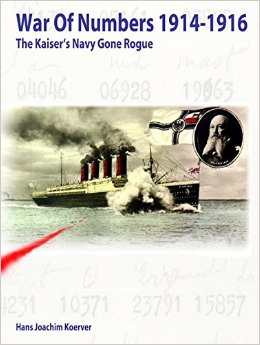 By Hans Joachim Koerver, Dr. Cynthia Dyre-Moellenhoff (ed.), LIS Reinisch Verlag, Steinbach, (2016)
By Hans Joachim Koerver, Dr. Cynthia Dyre-Moellenhoff (ed.), LIS Reinisch Verlag, Steinbach, (2016)
Reviewed by Eric Dietrich-Berryman, Ph.D.
War of Numbers is not a long book but packs impressive, relevant detail, much of it original from the author’s searches through British records. Arguments pro and con in the Imperial German Navy are here, as is the Kaiser’s peculiar role in naval affairs and his ambivalence about a ruthless submarine campaign. The pro-active, radical U-Boat commander side strenuously worked the numbers in its favor.
They “proved” how the tally of ships, resupply of Britain’s food requirements, manpower allocations, and industrial production could theoretically be hammered into submission quickly in an all-out U-Boat offensive. Short. Bloody. Decisive. Or so they believed. Therein lies the “gone rogue” indictment in the book’s title.
It was not to be, and War of Numbers explains why, point-by-point.
Issues of strategic, tactical, diplomatic, commerce and logistics were too often poorly understood or molded by intense military-political rivalries. Mismanagement and miscalculation affected both sides, most especially Germany’s. It was Imperial Germany’s comprehensive underestimation of American public antipathy to U-Boats sinking without warning merchantmen, passenger liners and hospital ships that propelled a heretofore reluctant United States into the war some thirty-four months after its start.
Without America’s immense industrial strength and fresh, eager personnel reserves, her vitality and exuberance, Britain, France, and Germany would have fought themselves to exhaustion. The crux of the matter was that Germany was pretty sure that she could not prevail on the battlefield without the intervention – and quickly – of some form of deus ex machina. The new, surprisingly effective, submarine seemed to be the answer. Elsewhere, reversals were mounting.
Britain rebuffed a German peace initiative in late 1916. Time was not on Germany’s side. Britannia ruled the waves, but superannuated admirals in Berlin and its High Seas Fleet pushed for construction of more capital ships. A much younger element centered on a cadre of eager submariners pushed for a no-holds-barred U-Boat offensive that they were certain would tip the balance of power, and force Britain to sue for peace before America could properly digest – or react – to the dramatic change in strategy.
It was not to be. All that came of it was calumny and an aghast American public. Oddly, the Germans ended unrestricted U-Boat warfare in the spring and summer of1918 in the Western Atlantic as the world’s first long-range U-Boats could marauder along the North American and Canadian coast with near-impunity – and no losses. With armed British merchant ships excepted, U-Boats stopped ships with a shot across the bow, searched for contraband, put crews in lifeboats (or, sometimes aboard the U-Boat) stocked with blankets and provisions and given directions to the nearest landfall. U-Boats shelled the Jersey and Maine coast, mined harbors (a German mine sunk the armored cruiser USS San Diego off Long Island), and cut communications cables.
All the headline events are here: Lusitania, Arabic, Sussex. The death of Americans in both foreign-flag as well as US-flagged vessels. (Among Lusitania‘s casualties was Richard Freeman who gave away his life jacket to a female passenger. He had been best man at Chester Nimitz’s marriage to his sister, Catherine Freeman, and was returning to Europe after the wedding.)
Nowadays, public outrage over unrestrictive submarine warfare seems almost quaint. Human comprehension lags behind weapons evolution, clearly. “Torpedo los!” at anything the enemy pushes out to sea is a commonplace now, at least since Fleet Admiral Nimitz rescued Grand Admiral Dönitz from the gallows at Nuremberg seventy years ago.
Hans Joachim Koerver has few rivals in the knowledge of Royal Navy primary source materials, heretofore deeply classified material or the treasures to be found in London’s suburb of Kew, in Richmond at the National Archives. War of Numbers needs to be in the library of anyone interested in the Great War, submarine history, Germany’s political machinations of the time, and the RN’s supremely effective intelligence arm. Illustrations are superior in the Kindle edition.
The book deserves a much more fulsome index, and printed sources are left in their original German, which is not helpful. The English prose is clunky at times, but not enough to hobble comprehension or flow. It is an enthralling read and a book well-worth owning.
Dr. Eric Dietrich-Berryman, is the author of The Kraut: On Being German after 1940, which was reviewed in NHBR in April 2016.

